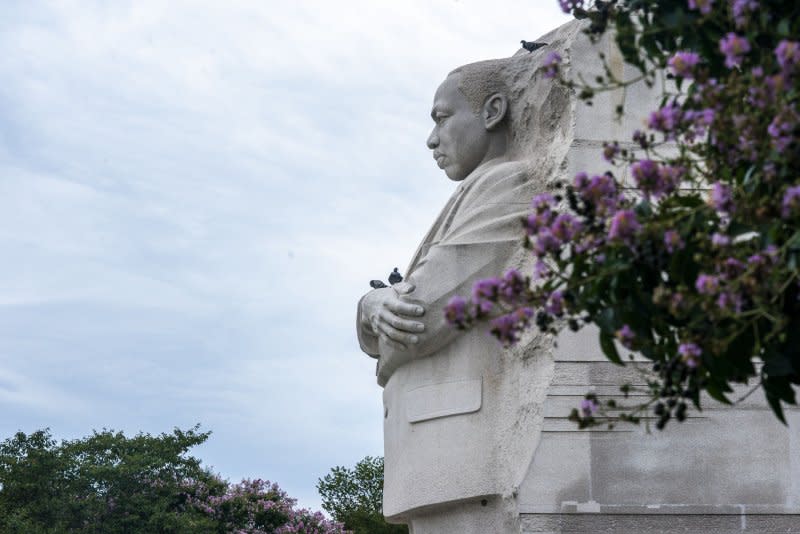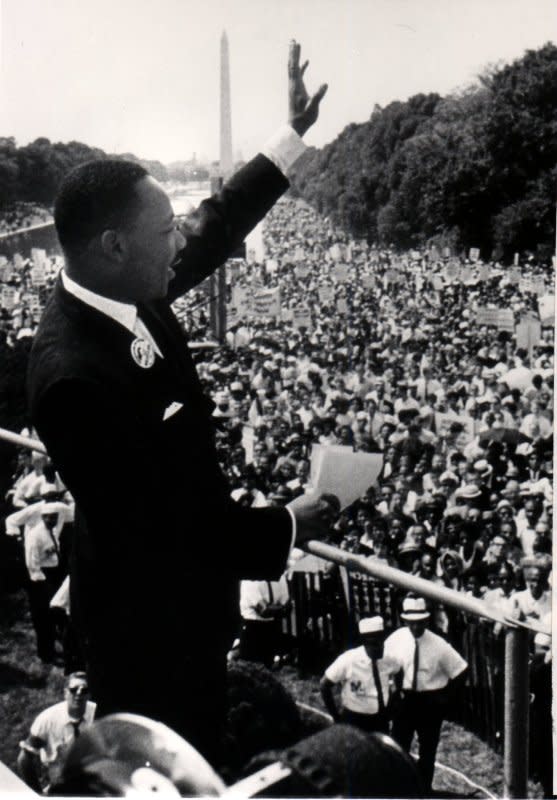MLK family, rights leaders mark 60th anniversary of March on Washington

- Oops!Something went wrong.Please try again later.
- Oops!Something went wrong.Please try again later.
- Oops!Something went wrong.Please try again later.
Aug. 26 (UPI) -- The family of the Rev. Martin Luther King Jr. and other civil rights leaders marked the 60th anniversary of the historic March on Washington on Saturday with an event starting from the Lincoln Memorial.
Thousands of people gathered to mark the milestone anniversary event at the exact location where King gave his memorable "I Have a Dream" speech, WTOP-TV in Washington, D.C., reported.
King's son, Martin Luther King III, his wife Andrea Waters King, and civil rights leader Rev. Al Sharpton were among those in attendance.
Participants met at the Lincoln Memorial at 7 a.m. before marching through the streets of the capital. The National Park Service closed streets in area for the day's events.
Organizers said Saturday's event wasn't meant to be just a commemoration of the inaugural march in 1963, but a "continuation" of the efforts to fight for equality across ages, genders and races.

"The unified march will be a collective response to the vitriol, rise in hate crimes, attacks on civil rights and protections and threats to democracy itself," said Ashley Sharpton, founder of the National Action Network's Huddle and daughter of Rev. Al Sharpton. "The time to speak with one voice is now."
Elected officials emphasized the link between the civil rights era and current politics.

"Sixty years later we've come a long way, but we still have some things that have to be worked out," Rep. Hakeem Jeffries, D-N.Y., told the crowd.

Rep. James Clyburn, D-S.C., made an ostensible reference to new Florida education guidelines that have been accused of downplaying the evils of slavery.
"We come today to break our silence. We come today to let the governor of Florida know that he will not erase our history," he said, adding, "We come here today to let the governor of Texas know that he will not overturn our votes."
Rev. Al Sharpton took to the podium and led the crowd in chanting "no justice, no peace."
More than 200,000 people gathered on the National Mall on Aug. 28, 1963, for what was officially known as the March on Washington for Jobs and Freedom. The event called for civil and economic rights for Black Americans at the height of the civil rights movement.
Standing on the steps of the Lincoln Memorial, the Rev. Martin Luther King Jr. delivered his historic "I Have a Dream" speech, saying "the time is now" for equality and an end to racism.
"Now is the time to make real the promises of democracy. Now is the time to rise from the dark and desolate valley of segregation to the sunlit path of racial justice," he said. "Now is the time to lift our nation from the quick sands of racial injustice to the solid rock of brotherhood. Now is the time to make justice a reality for all of God's children."
President John F. Kennedy met with 10 of the march leaders for more than an hour, saying he couldn't help but be impressed with the "deep fervor and the quiet dignity" of the event, UPI reported at the time. Kennedy called for new civil rights legislation, which wasn't passed until after his death a mere three months after the march.
Kennedy's predecessor, President Lyndon B. Johnson, signed the Civil Rights Act of 1964 on July 2, 1964, outlawing discrimination based on race, skin color, religion, sex, or nation of origin. It ended racial segregation in schools and other public spaces, and expanded employment and voter registration protections.
Following Saturday's march, the King Center plans to hold a youth forum Monday titled "I Have a Dream, What's Yours?" The 10:30 a.m. EDT event will be streamed live on YouTube, Facebook and X, the social media network formerly known as Twitter.

